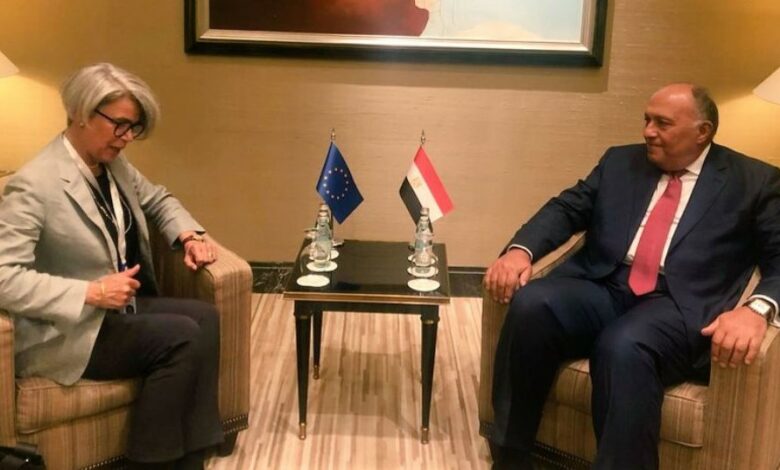
Egyptian Foreign Minister Sameh Shoukry met with the European Union’s Special Representative for the Horn of Africa, Annette Weber, on the sidelines of the 17th edition of the regional security summit Manama Dialogue, which is organized by the Bahraini Ministry of Foreign Affairs in cooperation with the International Institute for Strategic Studies (IISS), to discuss issues such as the Grand Ethiopian Renaissance Dam.
The Egyptian Foreign Ministry said that the meeting also touched on ways to support pillars of security and stability in the region, and the latest developments in the Horn of Africa.
Shoukry met with several ministers and senior officials to discuss the most pressing regional issues and exchange views on the various challenges facing the region and ways to respond to those challenges.
A large number of foreign ministers and leaders of regional and international organizations participate in the summit from November 19-21.
The Egyptian Minister of Irrigation and Water Resources, Mohamed Abdel-Aty, said on Saturday that any water shortage due to the GERD will affect workers in the agricultural sector, which will cause social and security instability in the region and increase illegal immigration.
This came during Abdel-Aty’s meeting with a water expert in the US government Matthew Parks, the US deputy ambassador in Cairo Nicole Champagne, and representatives of the US embassy.
Egypt, which relies considerably on freshwater from the Nile, has voiced fears that the GERD would negatively impact the country’s water supply, and has insisted that measures be put in place to protect downstream countries in case of drought during the dam’s filling process.
Egypt and Sudan say they want a legally binding agreement, while Ethiopia says any pact should be advisory. Egypt and Sudan consider the dam a threat to their vital water supplies, while Ethiopia considers it essential for development and doubling its electricity production.
The downstream nations fear possible blows to water facilities, agricultural land, and overall availability of Nile water. Negotiations over the dam between Egypt, Ethiopia, and Sudan have stalled for years, with the three parties ultimately failing to reach any concrete agreements.
The disputed dam is the largest hydroelectric project in Africa, with a cost of more than four billion dollars. The construction of the dam began in 2011. It is considered to be one of Egypt’s most serious water issue.




